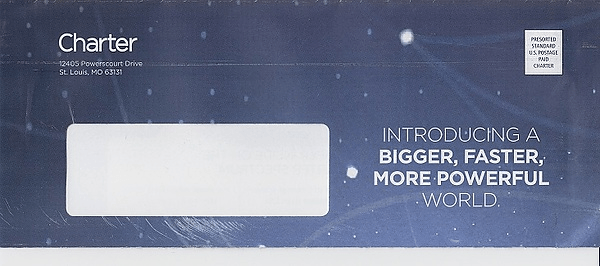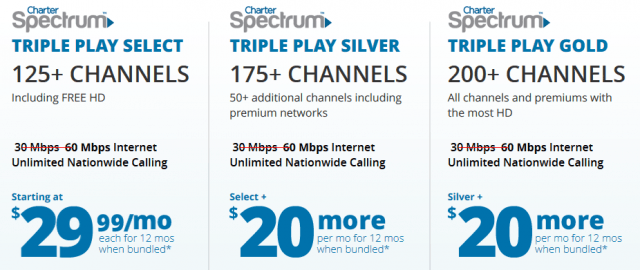
The Plain English Campaign’s Golden Bull Award is given to companies that prefer gobbledygook over plain English.
Comcast is outraged by slanderous suggestions it has data caps on its broadband service.
In response to the scathing report from the Writers Guild of America that pleads for the FCC to block the merger of Comcast and Time Warner Cable, Comcast has accused to WGA of getting its facts wrong and being nothing more than a meddling union.
The WGA writes in their filing with the FCC:
The WGAW has also joined Public Knowledge in asking the FCC to enforce the condition that Comcast not use “caps, tiers, metering, or other usage-based pricing” to treat affiliated network traffic differently from unaffiliated traffic. Comcast has violated this condition by exempting its online video service, Xfinity Streampix, from its own data caps, while the viewing of content by other, unaffiliated video services such as Netflix or YouTube would count against a user’s data cap. The violation of this merger condition is a clear threat to competition from online video distributors, and the FCC should respond by requiring Comcast to stop exempting its Streampix service from data caps.
Comcast pounced on the WGA filing, calling it inaccurate.
 “We don’t have data caps — and haven’t for about two years,” said Sena Fitzmaurice, Comcast’s vice president of government communications. “We have tested data thresholds where very heavy customers can buy more if they want more — but that only affects a very small percentage of our customers in a few markets.”
“We don’t have data caps — and haven’t for about two years,” said Sena Fitzmaurice, Comcast’s vice president of government communications. “We have tested data thresholds where very heavy customers can buy more if they want more — but that only affects a very small percentage of our customers in a few markets.”
Until 2012, Comcast had a uniform usage cap of 250GB a month, above which a customer risked having their broadband service suspended. In 2013, the usage allowances were back, reset at 300GB a month and rolled out to a series of expanding “test markets” that today include Huntsville and Mobile, Ala., Atlanta, Augusta and Savannah, Ga., Central Kentucky, Maine, Jackson, Miss., Knoxville and Memphis, Tenn., and Charleston, S.C.
 Customers who exceed this allowance won’t have their broadband service suspended, they will just get a higher bill, as Comcast charges $10 for each additional 50GB of usage.
Customers who exceed this allowance won’t have their broadband service suspended, they will just get a higher bill, as Comcast charges $10 for each additional 50GB of usage.
In contrast, Time Warner Cable neither has a data cap or a data threshold. Stop the Cap! made sure that didn’t happen when Time Warner attempted to impose its own usage limits back in 2009. We successfully organized protests sufficient to get Time Warner executives to back off and shelve the idea. If Comcast takes over, Time Warner Cable customers will likely eventually face Comcast’s “data thresholds,” which are a distinction without much difference. Whatever you call it, it’s a limit on how much a customer can use Comcast’s already-expensive broadband service before bad things happen.
The WGA and Comcast get along about as well as oil and water, so the back and forth is to be expected. The Writer’s Guild also fiercely opposed Comcast’s merger with NBCUniversal. But when it comes to who is playing fast and loose with the truth, it isn’t the group that writes for a living. Comcast’s doublespeak about data caps is no better than calling The Great Recession a periodic equity retreat. It isn’t fooling anyone.
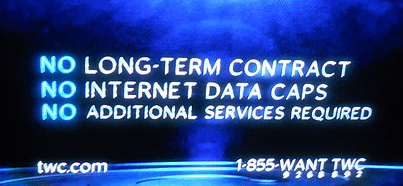 Time Warner Cable has introduced a new marketing message to potential customers, promoting the fact its broadband service has “no data caps.”
Time Warner Cable has introduced a new marketing message to potential customers, promoting the fact its broadband service has “no data caps.”

 Subscribe
Subscribe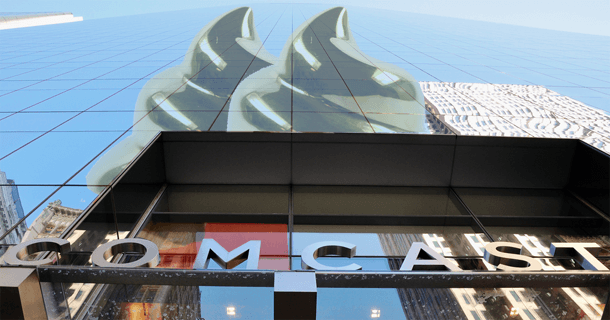
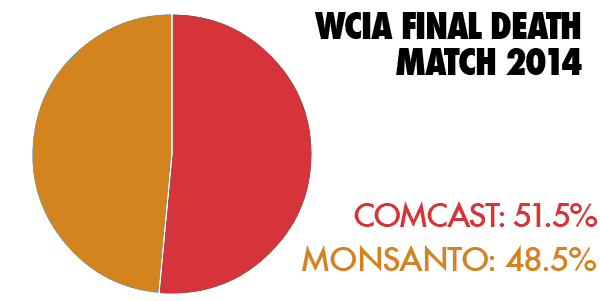

 “We don’t have data caps — and haven’t for about two years,” said Sena Fitzmaurice, Comcast’s vice president of government communications. “We have tested data thresholds where very heavy customers can buy more if they want more — but that only affects a very small percentage of our customers in a few markets.”
“We don’t have data caps — and haven’t for about two years,” said Sena Fitzmaurice, Comcast’s vice president of government communications. “We have tested data thresholds where very heavy customers can buy more if they want more — but that only affects a very small percentage of our customers in a few markets.” Customers who exceed this allowance won’t have their broadband service suspended, they will just get a higher bill, as Comcast charges $10 for each additional 50GB of usage.
Customers who exceed this allowance won’t have their broadband service suspended, they will just get a higher bill, as Comcast charges $10 for each additional 50GB of usage. Comcast customers using the company’s growing network of Wi-Fi network hotspots will have their usage tracked to their broadband accounts, opening the door for Comcast to count wireless use against a customer’s future monthly usage allowance.
Comcast customers using the company’s growing network of Wi-Fi network hotspots will have their usage tracked to their broadband accounts, opening the door for Comcast to count wireless use against a customer’s future monthly usage allowance.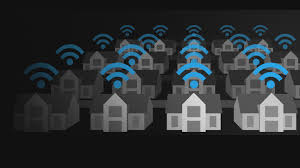 Xfinity WiFi Neighborhood Hotspots – In June of last year, Comcast announced its plans to create millions of WiFi access points for its customers through a neighborhood hotspot initiative. Comcast is the first major ISP in the country to deploy this innovative technology. This new initiative gives customers with Xfinity Wireless Gateways an additional “xfinitywifi” signal (or SSID) in their home that is completely separate and distinct from the private and secure home WiFi signal. Offered at no additional cost, the additional WiFi signal will allow visiting Xfinity Internet subscribers instant, easy access to fast and reliable WiFi without the need to share the home’s private network password and without an impact to the home subscriber’s speed. And since visitors sign in with their own Xfinity credentials, their usage and activities are tied back to their own accounts, not the homeowner’s.
Xfinity WiFi Neighborhood Hotspots – In June of last year, Comcast announced its plans to create millions of WiFi access points for its customers through a neighborhood hotspot initiative. Comcast is the first major ISP in the country to deploy this innovative technology. This new initiative gives customers with Xfinity Wireless Gateways an additional “xfinitywifi” signal (or SSID) in their home that is completely separate and distinct from the private and secure home WiFi signal. Offered at no additional cost, the additional WiFi signal will allow visiting Xfinity Internet subscribers instant, easy access to fast and reliable WiFi without the need to share the home’s private network password and without an impact to the home subscriber’s speed. And since visitors sign in with their own Xfinity credentials, their usage and activities are tied back to their own accounts, not the homeowner’s. Charter Communications’ latest attempt to rehabilitate its reputation with customers in Fort Worth, Tex. arrived this week in area mailboxes, as Charter reintroduced itself as “Charter Spectrum.”
Charter Communications’ latest attempt to rehabilitate its reputation with customers in Fort Worth, Tex. arrived this week in area mailboxes, as Charter reintroduced itself as “Charter Spectrum.”